- Home
- Hugo Hamilton
Headbanger
Headbanger Read online
HEADBANGER
Pat Coyne is a Dublin policeman who is passionately devoted to sorting out the world and its problems. For Coyne, such things as cars, crime, pollution and golf are all ominous signs of a disintegrating society. The world is committing suicide, with MTV droning in the background. Coyne’s principal mission is to deal with crime, Ireland’s biggest growth industry. Though only a cop on the beat, Coyne decides to take on the notorious gang leader, Drummer Cunningham. When a murder investigation leaves detectives clueless, he enters into a personal feud with the underworld, resulting in disastrous consequences for himself and his family. Coyne is a Dublin Dirty Harry for whom everything begins to go wrong.
About the author
Starting out as a journalist, Hugo Hamilton went on to write short stories and novels. He is now the author of six novels, two memoirs and a collection of short stories. His work has won a number of international awards, including the 1992 Rooney Prize for Irish Literature, the 2003 French Prix Femina Etranger, the 2004 Italian Premio Giuseppe Berto and a DAAD scholarship in Berlin. He has also worked as a writer-in-residence at Trinity College, Dublin. Hamilton was born and lives in Dublin.
PRAISE FOR HUGO HAMILTON
‘Hamilton is a great international writer (who just happens to be Irish)’ – Anne Enright
‘Coyne is a majestic creation… If Flann O’Brien’s lunatic Professor De Selby had genetically engineered a cross between the novels of Raymond Chandler and those of Patrick McCabe, this is what the progeny might well have looked like’ – Times
‘The Pat Coyne novels are mad, wonderful things – so funny, unpredictable and brilliantly written’ – Roddy Doyle
For Mary Rose
The author would like to thank David Collins of Samson Films for his generous support and encouragement while writing this book.
HEADBANGER
Coyne was a father figure to the city of Dublin, holding his paternal arm around its suburbs, protecting its inhabitants like a family. He was a member of the Garda Siochana, guardian of peace; a cop, pig, rozzer, fuzz, bluebottle, who drove the squad car with both hands on the steering wheel, alert and ready for the next situation. His navy-blue Garda cap lay on the ledge beneath the back window, along with that of his colleague, Garda McGuinness. Now and again, the voice from headquarters broke in over the radio, drawing attention to the city’s emergencies, traffic accidents, little rust spots of criminality. It was a bright autumn afternoon, a day on which nothing much had happened yet, and beside him, McGuinness was going on about golf, explaining at length how he had to let Superintendent Molloy win a game.
Molloy couldn’t play golf to save his life, McGuinness was saying. It’s an act of charity. I had to turn my back and pretend I didn’t see him putting the ball back.
But Coyne was only half listening to this golf tirade because he was more concerned with the state of the world outside, observing every tiny detail in the street, waiting for something suspicious to turn up. Coyne – the real policeman – a massive database of ordinary facts and figures, licence plates, faces and social trivia. No detail too small.
Coyne saw the woman in a motorised wheelchair moving up the street. He saw the security van pulling up outside the post office and one of the uniformed men getting out carrying a steel case shackled to his arm. The reassuring emblem on the side of the van, like a Papal insignia – two crossed keys and a slogan underneath saying: vigilant and valiant. At the traffic lights, Coyne scanned the faces at the bus stop as though they were all potential criminals. Everybody looking mysteriously down the street like a bunch of weather vanes to see the bus coming. On the pavement, the usual chewing-gum droppings stuck to the ground in their thousands; flattened discs of dirty off-white or off-pink gum-pennies that people spat out before getting on the bus.
Garda Pat Coyne would be in a position to reconstruct every faithful detail in evidence. Your honour, the youth was seen spitting a grey substance in the direction of the oncoming bus. Your honour, the lady at the front of the queue carried an upturned sweeping brush. When the time came, Coyne was in possession of the facts.
Vigilant and valiant. Somehow, the words applied more to Coyne himself. Mind you, he’d come across some fairly peculiar slogans on the sides of vans lately. Signs like: East Coast Glass – Your Pane is our Pleasure. Or else: Personal Plumbing Services – day and night. And the oddest one of them all was the ‘Dip–Strip’ van, boasting all kinds of stripping services. I mean, how were you to know it was furniture they were talking about? Were the people of Ireland trying to look like complete eejits or what? Somebody should go up and point out how absolutely absurd they looked. ‘Embibing Emporium’ was another Dublin idiosyncrasy that sprang to mind. As a Garda, Coyne took an interest in the precision of language, and one of these days he would walk straight into that pub, slap a concise Oxford down on the bar counter and say: you pack of right honourable gobshites, you can’t even fucking spell. Look, it’s I, not E. Imbibing.
These were the things that mattered to the sensibilities of a cop, not who could or could not strike a golf ball. Whatever way you whacked the thing, it was predestined to seek only one conclusion, that was to go down a hole.
Molloy might as well be playing golf with a shovel, McGuinness went on. He’s got this fabulous Ping driver and he keeps hacking the fairway with it. I swear to God, you’d think he was cutting turf.
Coyne remained silent. His attention was drawn instead to the window display of a lingerie shop. He examined its contents of bras and knickers; a purple camisole; an amputated leg doing a solo cancan; a dismembered female torso cut off at mid thigh and squeezed into a beige corset; a black plastic bust wearing a white lace bra and a large sign, written in red capital letters, saying: BRAS REDUCED. Another sign saying: NIGHTWEAR 20% OFF.
What are they talking about – bras reduced?
Coyne slapped his hands on the steering wheel and, for a moment, both men were staring intensely at this new shrinking phenomenon. As though the women of Ireland were heading into some kind of physical recession. Erin go Bra – that great cry for national freedom would have to be reassessed.
With the afternoon sunshine sloping across the city, he turned the squad car down the street towards the sea and saw a band of water shimmering like a cool blue drink at the bottom of a glass. Even though it was autumn already, Coyne could vividly remember the summer and the people walking along with rolled-up towels, ghettoblasters on their shoulders; prams with parasols; girls who had forgotten to turn over and went crimson on one side of the face, or crimson down the backs of their legs. Now there was nobody except an old man leaning over the granite wall staring out at the ferry.
The kids were back at school, but Coyne still carried with him the rather sad summer image of an upturned ice-cream cone with a white pool spreading out along the pavement, and a crow with tattered charcoal wings tilting his beak to drink from some child’s misfortune. To Coyne it was a symbol for all the invisible tragedy that lurked underneath society. He was there to make sure that the enemies of happiness were banished. Somebody had to deal with all the brutality and misery. And Coyne was going to kick ass, as they kept saying on TV. He was going to sort out some of these bastards. Blow them away. The Dublin Dirty Harry. He had a list of names in his head, like a top ten of local criminals.
Every muscle in his body was spring-loaded and ready for action. He was in a state of cataleptic readiness, lying dormant like a lethal virus that was going to rain down on some of these characters. He had put some of the hoors away before. And he wasn’t finished yet either. You know, Coyne thought, while McGuinness was still going through every stroke on the Straffan golf course, life wasn’t meant to be stationary. Life w
as more than a series of shagging holes on a green landscape. It had to have momentum, like music. Coyne wasn’t the kind of cop with the cap tilted on the back of the head. No way.
Then it came: the situation. The familiar voice on the radio speaking with precise eloquence.
Ballsbridge area. Armed robbery in progress. Newsagent cum post office. We believe the raiders are still on the premises.
McGuinness picked up the radio mouthpiece and got the exact details, the very post office they had just passed by five minutes ago. Coyne swung the car around. With the siren on, they howled through the streets, blue light flashing back at them from doors and windows as they passed. Maybe this time they would really punch the clock. They arrived just in time to see a motor bike skidding off the pavement out on to the road. Hey Joe, where would you be going with that bag in your hand? Coyne was on the ball, only fifty yards behind.
We have them, Larry, he said. And as he caught up with them, he could have knocked them down with a tiny shove, only that one of the raiders on the back of the bike turned around and hurled a hatchet at them. Coyne took evasive action. Braked and skidded. But the hatchet came crashing through the windscreen like a shark through the side of an aquarium. Glass everywhere. Diamonds cascading all over their laps.
Jesus Christ, McGuinness said, his eyes open wide, staring at the hatchet stuck in the windscreen as if it were alive.
Coyne broke through and cleared away some of the glass with his elbow, then accelerated once more. He hadn’t lost them yet, and after the next junction, he caught up with them again, just as they were heading into a small laneway at the end of which the raiders dropped the bike and jumped over the wall into the gardens, engine left running and the back wheel continuing to spin out like roulette. Coyne brought the car to a halt.
Don’t be crazy, McGuinness urged.
But Coyne was going after them. No wonder they called him Mr Suicide back at the station. In the attempt to apprehend the raiders he jumped over the wall and came close to being savaged by a dog. He crossed the gardens like an obstacle course. Almost severed his leg from the knee down on a wheelbarrow and, in the end, very nearly got himself killed by the passing DART when he tried to give chase across the railway line. Jumped back just in time.
Bastards. Forced to give up the chase, Coyne limped back to talk to a woman who was standing in shock at the centre of a vegetable plot with her gardening gloves clasped as in prayer. They both faced each other suddenly, as though they were at a shrine together. Coyne out of breath and half kneeling to examine the footprints across the trampled leeks. He was embarrassed that he could not recover his breath more quickly. His chest was so badly out of condition that it felt like he was playing the accordion with himself. A tiny E flat note whistling through the air passages like a bent reed.
There had always been a sort of imaginary audience in Coyne’s head. After all, a man’s life was a performance. At this moment, the reaction would have been a short, modest applause, tailing off to silence, everybody waiting for his next move. Now and again, at crucial moments, he would talk to his audience, justifying his motives. Now and again, his audience merged with the real people he knew – his wife Carmel, his late father, his mentor Fred, and his friend Vinnie Foley. God knows who else was there in Garda Pat Coyne’s audience? His friend Billy who had emigrated to Australia. Even his enemies maybe. And the top ten victims were always there in the front row admiring his tenacity in the face of all odds.
The Novena in the garden. Coyne looked like he’d come for a miracle, inhaling furiously. When he finally regained his breath, he asked the woman if she had been able to identify any of the raiders. She shook her head. But Coyne already had his own suspicions and began to lift some of the soil up in his hand, trying to ascertain if it was organic.
Yes, the woman nodded. Totally organic.
Back in the patrol car, with the sections of laminated glass all over the floor, Coyne thought of his own safety for the first time. He had lost sight of any personal fear and stopped acting like a man with a wife and three children. He was being heroic and suicidal again. More like a younger man trying to impress his friends, or his girlfriend, with nothing to lose.
Pat, you’re a mad bastard, McGuinness crooned in his Tralee accent. You’re going to get yourself killed.
I nearly had the fuckers, Larry.
You nearly had yourself mangled, you mean.
It’s that bastard, Perry. I know it. He hasn’t seen the last of me, the little savage.
McGuinness held the hatchet in his hand, and you’d think he was going to burst into song, some kind of Kerry golfing ballad. I don’t want something like this in my skull, no thanks. It would be a terrible handicap on the golf course.
Garda Coyne was in his mid thirties, medium build and a narrow, handsome face. More handsome than he knew himself. He had a good smile, but more often bore an expression of great determination which made him look worried, or furious, or just stunned. Like he’d just been whacked on the back of the head with a newspaper and was ready to turn around and retaliate. A man who had his mind made up. A man who knew exactly what had gone wrong with the world.
He was a dedicated cop. Above and beyond the call of duty. He was following invisible goals, set by his own father, by his wife Carmel and by her mother, Mrs Gogarty. One day he would reach the rank of superintendent or commissioner. But Coyne was interested in more than that. He was a crusader and the streets of Dublin had gone out of control, simple as that. He was answering an inner mission to reform the society and clean up the city. And somebody was going to have to do something about the shaggin’ environment as well.
The world was fucked, basically. The problem was that Coyne frequently found himself making his case to empty houses. Nobody wanted to know. He was explaining his views to an uninterested audience at a matinée, with popcorn left all over the place and sticky patches where they had spilled Coke in the dark. People with nowhere else to go. There he was, telling them about the kind of world he wanted his wife and children to be able to live in, and the audience would just walk out on him, leaving only the cleaning staff with the sound of their buckets and brushes, letting in a brash blast of daylight, flooding the place with the banal sound of traffic from outside.
At home, Carmel was getting ready to go to her art classes – Painting for Pleasure. The brochure from the local night school had been hanging on the notice board for weeks, beside the gas bill, and surrounded by calendar pages of Chagall and Egon Schiele. Some of her own new paintings were also beginning to take over the kitchen wall.
Carmel was slightly younger than her husband. Small build, blonde hair and a round face. She had sad, light-blue eyes. In her own way, she was full of determination too, and looked like she was fond of arguing, but also ready to laugh at any minute. She wanted to go places. Do something interesting with her life. She was maternal but fiercely independent, and in a modest way, proud of her looks, especially her legs. She knew she had talent.
Her mother was in the kitchen with her, drinking tea. The children were playing in the hall: Jimmy trying to arrest his two little sisters, Jennifer and Nuala, persuading them that they had to go to prison in the cupboard underneath the stairs. He was reading them their rights – you have the right to remain silent, but everything you say will be taken down in evidence. Look, there was nothing to be afraid of, he reassured them. He allowed himself to be incarcerated first.
Carmel was packing her art materials, throwing pencils and brushes into her bag. Made her feel she was seven years old again. Held up the fattest of her brushes and pretended to use it as a blusher. They laughed and her mother almost choked on a mouthful of bitter tea, bringing tears to her eyes, not so much because of the inhaled liquid but because of a sudden sense of pride in her daughter. She blew her nose: a mixture of snot and tears and tea, remembering the little flat tins of water-colour paints Carmel had used as a child. Squar
es of magenta and scarlet and purple that became mixed into a brown mess after a few days.
You were always gifted, Carmel, she wanted to say, but there was a scream from the hallway and Nuala came running into the kitchen crying, sniffling, sitting up on her grandmother’s knee.
There you are, pet, Carmel’s mother said, wiping the child’s face. That’ll teach you never to marry a Guard.
Ah now, Ma. There’s no need for that, Carmel said, giving her mother a look.
At the station, Joe Perry had been taken in for questioning and Garda Coyne was pulling him apart over the raid on the post office. He was a young lad of seventeen, with milk moustache still clinging to his upper lip. He was wearing wide jeans and a hooded jacket. Just the kind of generic description they often put out on Crimeline. He seemed terribly casual as he was brought into the main office, looking around and smiling as though he was being ushered in for some kind of talk show, waiting for somebody to come and clip the little mike to his lapel. There was a kind of swing in his walk. The Ringsend swagger. He sat right underneath the cannabis poster – ‘you’ve got the wrong man’ written all over his face.
Coyne knew how to deal with these clowns. That grin didn’t fool him one little bit.
So it’s hatchets now, he said, leaning against a filing cabinet like it was the mantelpiece at home. But you could see Perry saying to himself: yah thick Garda gobshite. What do you expect me to say, yes?
Coyne approached Perry and jabbed him in the chest.
Chief Running-Foot, he said, waiting to see if the joke worked. You won’t be running very far now, you little savage. Coyne got the hatchet from his desk and held it up to Perry’s face. Exhibit A. Did you leave this behind by any chance? His personal audience roared laughing.
I done nothin’, I swear.

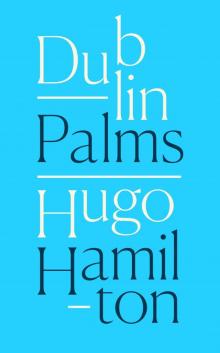 Dublin Palms
Dublin Palms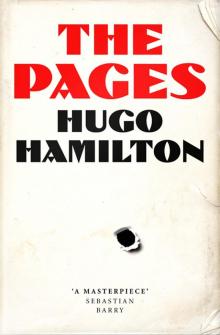 The Pages
The Pages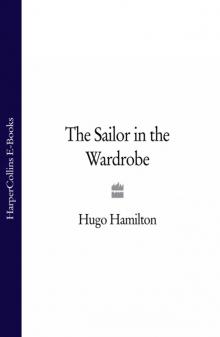 The Sailor in the Wardrobe
The Sailor in the Wardrobe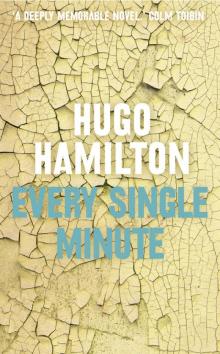 Every Single Minute
Every Single Minute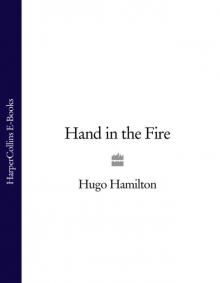 Hand in the Fire
Hand in the Fire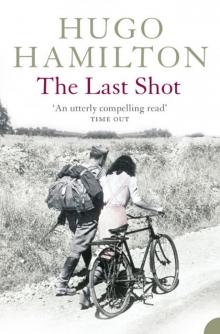 The Last Shot
The Last Shot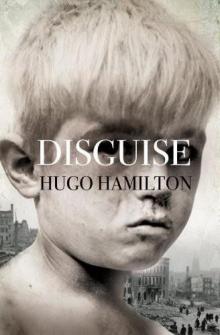 Disguise
Disguise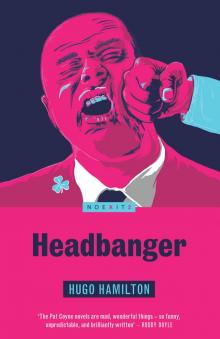 Headbanger
Headbanger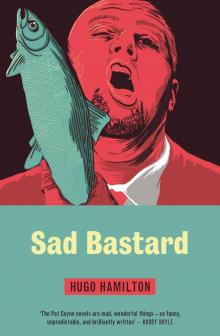 Sad Bastard
Sad Bastard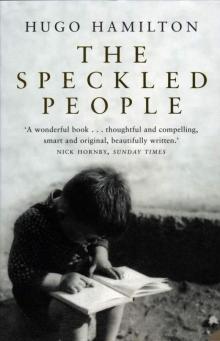 The Speckled People
The Speckled People